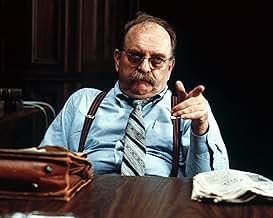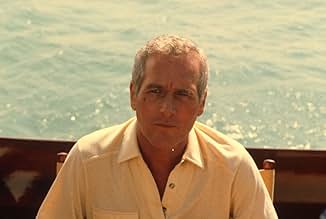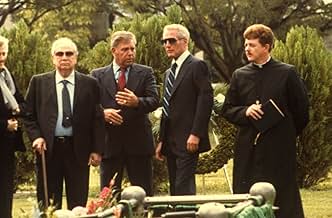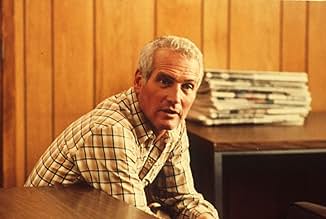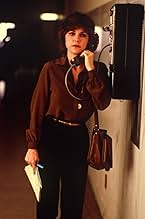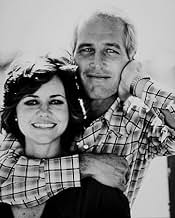AVALIAÇÃO DA IMDb
6,9/10
16 mil
SUA AVALIAÇÃO
Quando um promotor vaza uma história falsa de que o dono de uma loja de bebidas está envolvido no assassinato de um chefe de sindicato, a vida do homem começa a desmoronar.Quando um promotor vaza uma história falsa de que o dono de uma loja de bebidas está envolvido no assassinato de um chefe de sindicato, a vida do homem começa a desmoronar.Quando um promotor vaza uma história falsa de que o dono de uma loja de bebidas está envolvido no assassinato de um chefe de sindicato, a vida do homem começa a desmoronar.
- Direção
- Roteirista
- Artistas
- Indicado a 3 Oscars
- 3 vitórias e 8 indicações no total
Phanie Napoli
- Nickie
- (as Anna Marie Napoles)
William Kerwin
- Walker - Standard's Photographer
- (as Rooney Kerwin)
Avaliações em destaque
... as audiences would not relate to anything this cynical prior to Watergate. This was made only seven years afterwards.
Sally Field is an ethically-challenged reporter. With the help of an even more unscrupulous federal investigator, played by Bob Balaban, she writes a story that implicates Michael Gallagher (Paul Newman) in the disappearance & presumed murder of a union boss. Gallagher is on the radar because his uncle is a mobster. The film employs a procedural narrative that delivers little dramatic tension. The severest act happens off screen. The characters feel slightly underwritten. The exception is Melinda Dillon's poignant portrayal of Teresa Perrone, Gallagher's best friend, who occupies the moral epicenter.
While everyone else is playing a game of extreme cynicism, not uncommon in journalism and politics, Teresa feels most acutely. I liked the straight-forward approach and lack of style. Of course, director Sydney Pollack was never known as a stylist. I'm not saying this in the pejorative. I enjoy Pollack's work. Wilford Brimley makes a needed, late appearance to munch down on some scenery.
It does have the distinct feel of a film made to make a go for the Oscars, with Paul Newman making repeated failed runs at the Best Actor prize at this point in his career. Still Newman in the lead gave gave a film at that time the same amount of heft that Tom Hanks in the lead gives a film today.
Sally Field is an ethically-challenged reporter. With the help of an even more unscrupulous federal investigator, played by Bob Balaban, she writes a story that implicates Michael Gallagher (Paul Newman) in the disappearance & presumed murder of a union boss. Gallagher is on the radar because his uncle is a mobster. The film employs a procedural narrative that delivers little dramatic tension. The severest act happens off screen. The characters feel slightly underwritten. The exception is Melinda Dillon's poignant portrayal of Teresa Perrone, Gallagher's best friend, who occupies the moral epicenter.
While everyone else is playing a game of extreme cynicism, not uncommon in journalism and politics, Teresa feels most acutely. I liked the straight-forward approach and lack of style. Of course, director Sydney Pollack was never known as a stylist. I'm not saying this in the pejorative. I enjoy Pollack's work. Wilford Brimley makes a needed, late appearance to munch down on some scenery.
It does have the distinct feel of a film made to make a go for the Oscars, with Paul Newman making repeated failed runs at the Best Actor prize at this point in his career. Still Newman in the lead gave gave a film at that time the same amount of heft that Tom Hanks in the lead gives a film today.
I taped this lauded 80's movie months ago and prompted by the recent death of Paul Newman, finally made time to watch it, only realising as I did so that its director too, Sydney Pollack, has also lately taken his last bow. The film is about the corrupting power of trial by newspaper to damage and sometimes destroy innocent lives and in this particular case of one man's courage and ingenuity in fighting back, even for what seems in the end a Pyrrhic victory against his malefactors. Pollack's favoured ouevre certainly seemed to be contemporary thrillers, often positing a faceless establishment body, personified by dehumanised no-names and their usually destructive oppression of innocent individuals. Although dated by things like contemporary fashions and background music, (no-one surely can defend this era for its style and music!) these films (and there were loads of them in the mid 70's and early 80's - "All the President's Men", "Dog Day Afternoon", "The Verdict", to name but a few, often directed by the two Sydneys, Pollack and Lumet, and peopled by acting heavyweights like Pacino, Redford, Newman, Winger and Fonda) represent a largely neglected sub-genre of quality movie-making rarely seen today. The film at hand here, "Absence of Malice" occasionally lacks narrative drive and suspense but makes up for that with everyday realism, for example drawing in themes on disparate subjects like abortion and trade-union relations. With Pollack's usual high-standard cinematography, particularly his naturally-lit interiors and indeed exteriors, you always feel that this fictional story could actually be happening here and now. It's helped by good dialogue and the skills of the ensemble acting cast. Newman walks away with the acting plaudits, effortlessly drawing the viewer's sympathy and admiration although I was very impressed by Melinda Dillon's underplaying of her part as Newman's "close personal friend", caught in the cross-fire and also Wilford Brimley's cameo as the State Department official who effectively acts as judge and jury at the mini-courtroom climax. Sally Field, who was briefly, at this time, the it-girl for modern-day character parts, lacks some heft alongside the predominantly male cast and at times plays the part more like Jean Arthur than Faye Dunaway. You can also see her acting at key points, particularly in the scene when Newman loses his temper and almost assaults her. Despite a brief (perhaps unnecessary) romantic liaison between the two leads, the film ends satisfyingly with an enigmatic shot of Newman sailing (literally) into the sunset leaving a chastened Field behind. In conclusion then, an intelligent, thought-provoking, well-structured and plotted movie, its main theme still relevant today in tabloid-land.
There's really no other word for it. I find the whole of this movie compelling, from Sally Fields' naivete to Paul Newman's innocent who turns the tables on his prosecutors, to the various supporting characters who all have their little niche. The best of all is Wilford Brimley, who gets to chew scenery and totally steal the scene he's in. It's an intelligent drama, addressing a subject as relevant today as it was in '81, with just enough humor to leaven the whole thing.
Sydney Pollock directed this interesting drama starring Paul Newman as Miami Liquor salesman Mike Gallagher, who is the son of a mobster, though Mike himself is unconnected. When a Union Head is murdered, and mob involvement suspected, an overambitious Federal Attorney(played by Bob Balaban) decides to pressure Mike into helping them(even knowing his innocence) by going to irresponsible reporter Megan Carter(played by Sally Field) to publish the story. Mike has a solid alibi for the murder, but won't reveal it because it would hurt his fragile friend Teresa(played by Melinda Dillon) When the story(and her involvement) is published, it leads to tragic consequences, and Mike decides to teach the reporter and FBI a lesson by beating them at their own game...
Well acted and made drama makes good points about the media and personal responsibility. Almost goes wrong with misguided romance of Mike and Megan, but rights itself with memorable finale, with Wilford Brimley stealing the film in a fantastic supporting performance, laying down the law in amusing yet intelligent fashion.
Well acted and made drama makes good points about the media and personal responsibility. Almost goes wrong with misguided romance of Mike and Megan, but rights itself with memorable finale, with Wilford Brimley stealing the film in a fantastic supporting performance, laying down the law in amusing yet intelligent fashion.
This movie looks to have all the elements of a classic but somehow falls short. Unscrupulous prosecutor dupes reporter Field into creating (false) impression that businessman Newman was involved in a murder, in the hope that will somehow help his investigation. The lie has unexpected and tragic consequences, after which Newman turns the tables. Field is fine as liberated yet vulnerable thirty-something, Newman is also good if a little obscure in a difficult role; but Brimley as Asst US Attorney steals the show when he finally blows the whistle on everyone. Brimley's short time in this movie really is classic and Oscar-quality. The overall problem here is a little too much soapbox and not enough real emotion from nearly everyone.
Você sabia?
- CuriosidadesPaul Newman once said of this movie while publicizing O Veredicto (1982): "I'd rather have the freedom to do the kind of pictures like O Veredicto (1982) ... I enjoyed kicking the beejeezus out of the press in Ausência de Malícia (1981)."
- Erros de gravaçãoAfter spending his first night with Megan, Michael tells her as he is leaving that it is 5:30 a.m. It is clearly daylight outside. In Miami in mid-December, it would still be dark outside at that time.
- Citações
James J. Wells: You had a leak? You call what's goin' on around here a leak? Boy, the last time there was a leak like this, Noah built hisself a boat!
- ConexõesEdited into Absence of Satan (1985)
Principais escolhas
Faça login para avaliar e ver a lista de recomendações personalizadas
Detalhes
- Data de lançamento
- País de origem
- Idiomas
- Também conhecido como
- Ausencia de malicia
- Locações de filme
- Empresas de produção
- Consulte mais créditos da empresa na IMDbPro
Bilheteria
- Orçamento
- US$ 12.000.000 (estimativa)
- Faturamento bruto nos EUA e Canadá
- US$ 40.716.963
- Fim de semana de estreia nos EUA e Canadá
- US$ 97.667
- 22 de nov. de 1981
- Faturamento bruto mundial
- US$ 40.716.963
Contribua para esta página
Sugerir uma alteração ou adicionar conteúdo ausente


